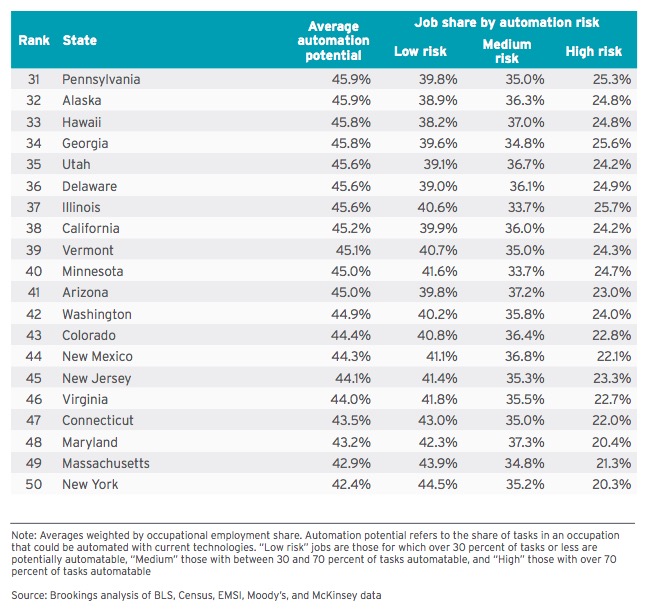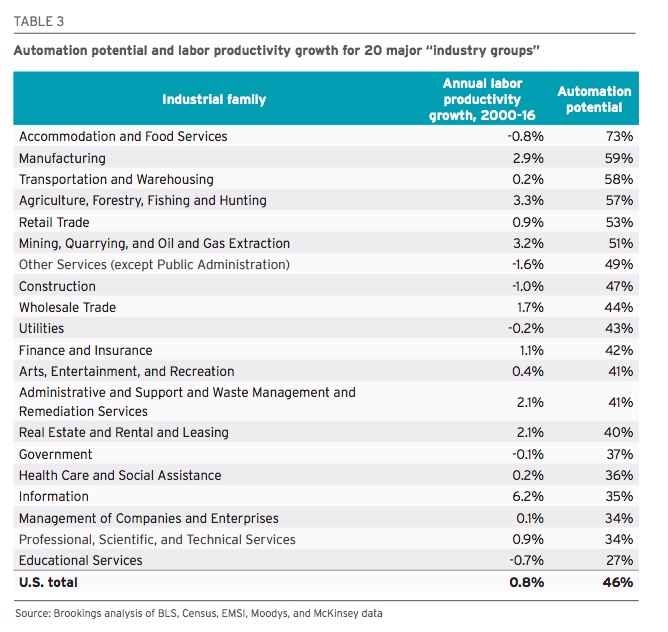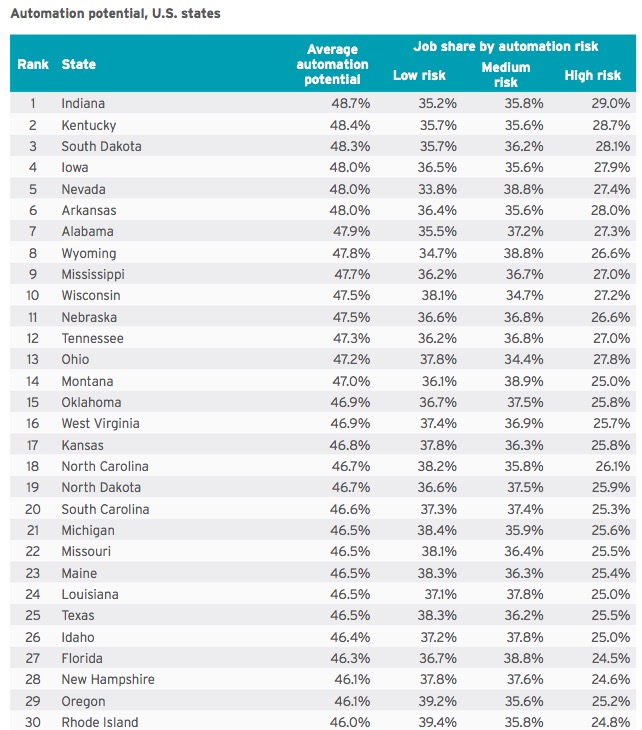Last updated on 2020-03-27
Governor Kristi Noem still hasn’t found the Next Big Thing that she’s hoping will plop into South Dakota’s economic lap to make it look like she’s doing something in Pierre. This Brookings Institution report (via Axios, via The Displaced Plainsman) thinks it has found the Next Big Thing that will hit South Dakota’s economy—automation—and Noem won’t want to be in the Governor’s seat when it hits Delete on a quarter of our state’s jobs:
Automation will take place everywhere, but its inroads will be felt differently across places, varying with local industry, task, and skill mix. Overall, smaller, more rural communities seem significantly more exposed to the automation of current-task content than larger ones. This relationship holds when comparing metropolitan to rural areas as well as among metros of different sizes. Among the country’s 100 largest metros, workers’ education attainment will prove to be decisive [Mark Muro, Robert Maxim, and Jacob Whiton, “Automation and Artificial Intelligence: How Machines Are Affecting People and Places,” Brookings Institution, 2019.01.24].

According to the Brookings Institution, the AI-driven wave of automation has the potential to replace 73% of accommodation and food service jobs; 59% of manufacturing jobs; 58% of transportation and warehousing jobs; 57% of agricultural, forestry, fishing, and hunting jobs; 53% of retail jobs, and 51% of mining, quarrying, and oil and gas extraction jobs. We lost 2,000 farms over the last five years; imagine losing 17,000 farms, 250+ per county, to robot tractors planting and harvesting by GPS.

Teaching, health care, and government are among the jobs less likely to be handed to artificial intelligence, but I wonder…. maybe we can automate the Governor’s office. Letting a robot run the state wouldn’t be much different from having Kristi automatically do whatever her big-money handlers program her to do….
A robot governor might be better equipped to rationally deal with the policy changes necessary to guide humans through the transition. Among other things Brookings recommends that robots would surely recognize as sensible but which the Noem Administration will resist as socialism (translation: big government investments that help everyone instead of just her family) are universal pre-kindergarten education (kids learn soft skills like creativity and curiosity earlier) and a “Universal Adjustment Benefit” that would include funding for automatic enrollment of every displaced worker in intensive career counseling, increased access to training, and far more robust financial support for transitioning workers:
As an initial step, all states should offer at least six months of unemployment benefits.112 Furthermore, the U.S. should extend income support for displaced workers in training to cover the full duration of the program, up to at least two years (as is already done with TAA). Additionally, states should increase the maximum income support threshold and index it to the average wage in the local area [Muro et al, Jan 2019, p. 58].
The authors point to the Danish “flexicurity” system as a successful model of the automation response they have in mind:
How does the Danish system work? When workers are laid off, they must register at a local job center or unemployed insurance fund office. Once they have done so, they can access a variety of skills assessments and job matching tools to determine their next step of employment. In order to keep workers engaged with the labor market, displaced workers receive an “activation offer” after a certain period of unemployment, which they must accept. If they do not, their unemployment benefits are reduced or cancelled. Activation offers can be training or a temporary subsidized job at a public or private employer. Temporary jobs tend to be low-wage work, which incentivizes the employee to find a job of their own volition.
In addition to job search support and a mandatory activation offer, workers receive generous income support. Unemployment benefits cover up to 90% of a worker’s pre-displacement wage, up to a maximum of 849 kroner (U.S. $130) per day. Workers may receive benefits for up to 24 months in any three-year period. And while fewer than half of unemployed U.S. workers receive unemployment benefits, nearly 80 percent of Danish workers have access to them.
So how does flexicurity hold up? Some 20 percent of the Danish labor force changes jobs in any given year. Despite this, the Danish unemployment rate never broken 8 percent during the Great Recession, compared to an EU-wide unemployment rate of 10.9 percent at its peak. Among the working age population, Denmark has an employment rate of over 74 percent, ahead of both the United States (70 percent) and the EU as a whole (68 percent). Furthermore, achieving these outcomes does not seem to depress worker productivity or entrepreneurial activity. Worker productivity is essentially the same in the U.S. and Denmark, according to the OECD.Meanwhile, Denmark ranks highly on global rankings of entrepreneurship, placing sixth out of 137 countries in the 2018 Global Entrepreneurship Index (the U.S. ranked first). Finally, some studies have suggested that combining flexible labor markets with greater employment security like in Denmark fosters greater risk-taking among workers [Muro et al., Jan 2019, p. 59].
Big social investment, higher workforce participation, competitive productivity, and possibly greater entrepreneurial risk-taking by workers—an honest robot would find that an excellent avenue to fulfill Asimov’s First Law, but The Displaced Plainsman worries that fake chess-playing turkeys like Noem and the Legislature haven’t shown themselves capable of preparing South Dakota for this change:
Over the past few sessions, the South Dakota legislature spent more time arguing about useless resolutions, placing the national motto in schools, civics classes, guns, and chislec than it has about funding K-12 education. There’s less hope that legislators or Governor Noem will suddenly decide to fund the retraining of workers [Leo Kallis, “South Dakota at Risk for Severe Job Losses,” The Displaced Plainsman, 2019.05.10].
The Next Big Thing will be tractors, Walmarts, and Super 8s run by robots. At your next local election forum, when your candidates pander to the pieties of narrow-minded right-to-life voters, see if you can get them to talk about how they’ll help all those little lives grow up to have productive working lives amidst the world of AI automation.

I read a long list of jobs that can be replaced by robots. Everything from pilots, train engineers, truck drivers to bankers. We seen the food service industry, warehousing and retail shopping rushing head long into robotics.
I try to resist whenever possible. I will always visit a human at the check-out lanes at the store. I will talk to a meteorologist at the flight service station as well as listening to the recorded pre-flight briefing.
Perhaps Noem might consider a high occupational tax on each robot to make them more expensive than a human. We need to have regulations in place to ensure robots don’t ‘run amok’ and crash as in the case of the 737 Max8 with their faulty software. AirBus had a software crash years ago also.
The ‘big money greedy globalists’ are behind robotics and all workers are in danger.
The ten states least likely to be harmed by the wonders of automation are all liberal except AZ and it’s as purple as a pasque flower. Why? Because liberal states stress innovation among our school kids. SD is 45th in innovation and the state government couldn’t care less, it seems.
Who knows whether enough robots will arrive soon enough to save South Dakota’s tourist and construction industry from devastation by our state’s xenophobes. A front page R.C. Journal headline today reads:
“Immigration debate hampers worker programs critical to SD businesses.”
The hatred engendered by the current Republican lack of empathy and denigration of people from south of our border who merely want freedom, safety and economic opportunity has undermined the ability of local businesses to recruit needed employees otherwise unavailable here is SD. It seems that the cruel name-calling and labeling of decent people in an effort to deghumanize them may be coming home to roost – after all we all know what we get when we spit into the wind.
The article makes mincemeat out of that old BS argument that immigrants steal American jobs. One business owner, Dani Banks, tells it like it is here is SD:
What our xenophobes reap we all sow.
This just in: Reuters:
Amazon is installing robots in at least 55 of their warehouses to package customer orders. An estimated 1300 human jobs are at risk. The ‘CartonWrap’ robots are manufactured by the Italian Company CMC Srl. An Amazon Representative said their goal was to operate a dark, lights out warehouse.
I personally have stopped doing business with Amazon years ago and shop local stores and retail outlets.
The WSJ reports that Citigroup is becoming deeply invested in Banking robots and believe customers are now more willing to abandon their traditional bank and local Bankers.
We need to stop the name calling, the political rhetoric, finger pointing and reflect on how each of us do business.
T. Camp is showing signs of a distinct cognitive distortion. He won’t shop Amazon but shops local stores instead to support local business. He’s missing the information that his local stores are buying wholesale from Amazon. In fact, one of the most profitable and fastest growing small business paradigms in USA is starting a company that sells wholesale Amazon products to local retailers cheaper than they can buy from their product affiliations with the manufacturer.
https://www.cnbc.com/2018/12/19/this-company-brings-in-millions-of-dollars-selling-stuff-on-amazon.html
No doubt these changes will be tumultuous, and the changes will difficult for some people and existing industries. But there may be silver linings. Consumer prices are likely to continue to go down, so the basics of life may be more affordable. And if as a society we don’t have to check out groceries or package boxes or sit for 12 hours in a tractor cab then we may have time to do things that are more enjoyable for the individual and society as a whole — run a blog, craft local furniture, start a whiskey distillery, play guitar, make designer cowboy boots or maybe even publish local magazines. Yankton used to have cigar factories, breweries with big smokestacks, live musicians on the radio and all sorts of cool stuff. Maybe technology will bring that back?
I forecast that the loss of jobs to automation will eventually force Americans to implement a Basic Income.
I don’t expect South Dakota to participate in that national conversation .
I’m with Silver Lining Bernie Hunhoff.
PS … Katie’s magazine is great this month.
We must trace the discussion back to the “Why?” At its core, this is all about owners squeezing more profit out a company for themselves — even at the cost of workers’ well-being. This is greed winning out over social consciousness period.
Porter: This isn’t about me. I’m doing what I can to trade with local business. I can’t help where they get their wholesale merchandise but I (and you too) can still have direct input as to who we do business with. I like to do business with my local merchants.
Porter’s and T’s discussion make me think: Don’t we also have to critically evaluate the real “shopping local” benefit? If my local business is not paying a fair wage – causing its workers to be on welfare, or is polluting, or is enjoying a TIF or other incentive that shifts financial responsibility to the community and off that business, do we still value that business? Spending becomes a display of values.
Bernie, I cannot share Porter’s optimism. Your utopian view assumes not only time for the individual, but some economic means to accomplish those things. The drive for the concentration of wealth to only the top (and automation is a way to promote that concentration of wealth) denies the ability of others — especially the shrinking middle-class — the opportunities you list.
Henry Ford understood that he had to create not only a product to sell, but also the consumers to purchase that product.
Terry C. – I like to do business locally, too. But, I don’t think that Amazon is hurting my local retailers. Amazon is probably helping them by providing a secondary place to buy product, by shipping directly to the local business’ customers and offering my local business’ better financial terms.
o – Your point is valid. Just because a cloud has a silver lining, it’s still a cloud … with no guarantee it’ll rain rewards any time soon.
O, it’s interesting that you bring up Henry Ford. He worried about the same things we are considering today: how modernization and urbanization might affect people and especially rural people. He was a champion of decentralization and keeping rural communities alive and well — and was there ever a better economic visionary? So government, business and community leaders should be addressing this … which is the gist, I think, of Cory’s post. You are surely right — people need to somehow make a living so they can reach their full potential. I’m suggesting that necessity has done wonders for people, and by necessity we may have to try new ways — and again there may be silver linings.
Good article CH
Interesting comments as well
Our tractors have auto steer nothing more, as you still have to be there. Interesting how
You can sit in an office and watch the planting
As TX already doing this as TX and KS don’t have the terrain and rocks we do in our area
Their fields are smoother than our SD roads
Minnesota is 40 and Colorado is 43. Maybe our current states and us expats have some good ideas? Obviously.
I think a basic income is going to be necessary also. I’ve been reading that many big industrialists are becoming very concerned about income inequality because they recognize that it’s bad for doing business. Makes no sense to destroy your markets.
Interesting that Henry Ford is brought up. I was just reading today about his attempt to create a Midwestern Utopia in Brazil. He bought land for a rubber plantation around 100 years ago. Brazilians did the work, but Ford saw himself as the great white father. He put them in US style home, built schools and Christian churches. They had to learn English, study typical US subjects in school, eat hamburgers, fried chicken, mashed potatoes and gravy, etc. By the time a year was up most of the workers had left, sick of Ford’s paternalism. After 2 years, Ford closed it down — failure.
Henry Ford was a good manufacturer, but not so much in human relations with non Midwesterners. (Think Jews as well.)
Porter, liberal states support liberal education. The only way humans add value in the marketplace is by distinguishing themselves from the machines. We teach humans their true, value-adding place in the world by teaching them the humanities.
Bernie people don’t know how to reach their “full potential”, as it starts with education.
Our rural schools and education system teaches the status quo.
Last time I checked, as it’s been awhile, I didn’t see automation, or cyber tech applied to agriculture in the curriculum. There is lack of science, (ever so needed,) in the entire k-12.
So until we ramp up the education. We will continue to produce the average, and this average unfortunately we sink lower and lower in the pay scale compared to the rest of the world.
As long as our state government is more worried about inequalities and religion, we will not conform into a high paying tech state where people flock to become a part of, increasing standard of living.
Sure the government will throw the people a bone once in awhile with a credit card company or assembly line with wages slightly above minimum to keep the people happy but there will be nothing for the career or mind development, just a living wage.